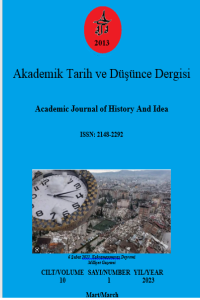Öz
In this study, the extent to which Turkey-Soviet Russia relations tended to develop and to tension in the 1919-1922 period and the reasons for these changes were emphasized. Weapons ammunition, financial aid, and attempts to organize a Soviet-type regime in Turkey are also discussed. It was a period when the relations between the New Soviet Russia and Turkey started with the 1917 revolution. However, due to various reasons, Turkey could not create an atmosphere of complete trust in its relations with Soviet Russia. Therefore, there was no principle of eternal friendship and eternal enmity, since interest was the primary concept in relations between States. Developments, such as the biased attitude of Soviet Russia towards the Armenian issue and the foreign commissioner of Soviet Russia, Chicherin's request Bekir Sami Bey to leave Van, Bitlis and its environs to the Soviet Russia, created an atmosphere of distrust between the Ankara Government and the deputies. In the secret session of the parliament, Hasan Fehmi Bey, the deputy of Gümüşhane, made the following statement that clearly expressed this issue: "What the tsarist thought? yesterday, the politics of today's Soviet Russia are also thinking the same thing". However, in this environment of conflicting trust, Turkey managed to improve its relations with Soviet Russia. There were developments in the relationship of mutual interest between the two countries.
Anahtar Kelimeler
Moscow Treaty Chicherin Atatürk Soviet Russia Armanian Issue
Öz
In this study, the extent to which Turkey-Soviet Russia relations tended to develop and to tension in the 1919-1922 period and the reasons for these changes were emphasized. Weapons ammunition, financial aid, and attempts to organize a Soviet-type regime in Turkey are also discussed. It was a period when the relations between the New Soviet Russia and Turkey started with the 1917 revolution. However, due to various reasons, Turkey could not create an atmosphere of complete trust in its relations with Soviet Russia. Therefore, there was no principle of eternal friendship and eternal enmity, since interest was the primary concept in relations between States. Developments, such as the biased attitude of Soviet Russia towards the Armenian issue and the foreign commissioner of Soviet Russia, Chicherin's request Bekir Sami Bey to leave Van, Bitlis and its environs to the Soviet Russia, created an atmosphere of distrust between the Ankara Government and the deputies. In the secret session of the parliament, Hasan Fehmi Bey, the deputy of Gümüşhane, made the following statement that clearly expressed this issue: "What the tsarist thought? yesterday, the politics of today's Soviet Russia are also thinking the same thing". However, in this environment of conflicting trust, Turkey managed to improve its relations with Soviet Russia. There were developments in the relationship of mutual interest between the two countries.
Anahtar Kelimeler
Moscow Treaty Chicherin Atatürk Soviet Russia Armanian Issue
Ayrıntılar
| Birincil Dil | İngilizce |
|---|---|
| Bölüm | Makaleler |
| Yazarlar | |
| Erken Görünüm Tarihi | 28 Nisan 2023 |
| Yayımlanma Tarihi | 25 Mart 2023 |
| Yayımlandığı Sayı | Yıl 2023 Cilt: 10 Sayı: 1 |

